 W
WIon Antonescu was a Romanian military officer and marshal who presided over two successive wartime dictatorships as Prime Minister and Conducător during most of World War II.
 W
WRadasłaŭ Kazimiravič Astroŭski was a Byelorussian collaborator with Nazi Germany who served as president of the Belarusian Central Rada, a puppet Belarusian administration under German administration in 1943–1944.
 W
WChen Gongbo was a Chinese politician, noted for his role as second President of the collaborationist Wang Jingwei regime during World War II.
 W
WEngelbert Dollfuss was an Austrian politician who served as Chancellor of Austria between 1932 and 1934. Having served as Minister for Forests and Agriculture, he ascended to Federal Chancellor in 1932 in the midst of a crisis for the conservative government. In early 1933, he dissolved parliament and assumed dictatorial powers. Suppressing the Socialist movement in February 1934 during the Austrian Civil War and later banning the Austrian Nazi Party, he cemented the rule of "Austrofascism" through the authoritarian First of May Constitution. Dollfuss was assassinated as part of a failed coup attempt by Nazi agents in 1934. His successor Kurt Schuschnigg maintained the regime until Adolf Hitler's annexation of Austria in 1938.
 W
WKarl Dönitz was a German admiral during the Nazi era who briefly succeeded Adolf Hitler as the German head of state in May 1945, until Germany's unconditional surrender to the allies in the same month. As Supreme Commander of the Navy beginning in 1943, he played a major role in the naval history of World War II. He was convicted of war crimes at the Nuremberg trials in 1946.
 W
WHans Michael Frank was a German politician and lawyer who served as head of the General Government in Nazi-occupied Poland during the Second World War.
 W
WIon Gigurtu was a far-right Romanian politician, Land Forces officer, engineer and industrialist who served a brief term as Prime Minister from 4 July to 4 September 1940, under the personal regime of King Carol II. A specialist in mining and veteran of both the Second Balkan War and World War I, he made a fortune in interwar Greater Romania. Gigurtu began his career in politics with the People's Party (PP) and the National Agrarian Party, moving closer to the far right during the 1930s, and serving as Minister of Industry and Commerce in the cabinet of Octavian Goga. Shortly after the start of World War II, Gigurtu was affiliated with King Carol's National Renaissance Front, serving as Public Works and Communications Minister and Foreign Minister under Premier Gheorghe Tătărescu, before the territorial losses incurred by Romania in front of the Soviet Union propelled him as Tătărescu's replacement.
 W
WOctavian Goga was a nationalistic and later far-right Romanian politician, poet, playwright, journalist and translator.
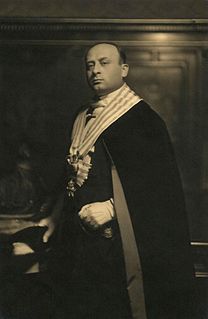 W
WGiuliano Gozi was Secretary for Foreign Affairs and de facto Fascist leader of San Marino from 1918 until 1943. He also held the role of Captain-Regent of San Marino 5 times between 1923 and 1942.
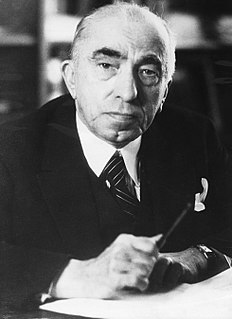 W
WEmil Dominik Josef Hácha was a Czech lawyer, the president of Czechoslovakia from November 1938 to March 1939. In March 1939, after the breakup of Czechoslovakia, Hácha was the nominal state President of the newly proclaimed German Protectorate of Bohemia and Moravia.
 W
WMaximiliano Hernández Martínez was the President of El Salvador from 4 December 1931 to 28 August 1934 in an acting capacity and again in an official capacity from 1 March 1935 until his resignation on 9 May 1944. He was the leader of El Salvador during World War II. While he served as President Arturo Araujo's Vice President and defense minister, a directorate seized power during a palace coup and afterwards named General Hernández Martínez President of El Salvador.
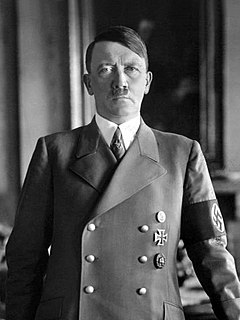 W
WAdolf Hitler was an Austrian-born German politician who was the dictator of Germany from 1933 to 1945. He rose to power as the leader of the Nazi Party, becoming the chancellor in 1933 and then assuming the title of Führer und Reichskanzler in 1934. During his dictatorship, he initiated World War II in Europe by invading Poland on 1 September 1939. He was closely involved in military operations throughout the war and was central to the perpetration of the Holocaust, the genocide of about six million Jews and millions of other victims.
 W
WKuniaki Koiso was a Japanese general in the Imperial Japanese Army, Governor-General of Korea and Prime Minister of Japan from 1944 to 1945.
 W
WPrince Fumimaro Konoe was a Japanese politician and prime minister. During his tenure, he presided over the Japanese invasion of China in 1937 and the breakdown in relations with the United States which ultimately culminated in Japan's entry into World War II. He also played a central role in transforming his country into a totalitarian state by passing the National Mobilization Law and founding the Imperial Rule Assistance Association.
 W
WPierre Jean Marie Laval was a French politician. During the time of the Third Republic, he served as Prime Minister of France from 27 January 1931 to 20 February 1932, and a second time from 7 June 1935 to 24 January 1936.
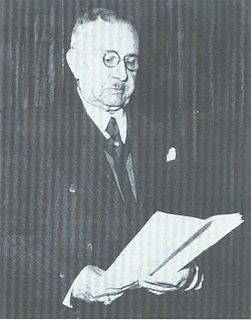 W
WNikola Mandić was a Croatian politician who served as a Prime Minister of the Independent State of Croatia (NDH) during World War II. He was executed by the Yugoslav Partisans as a war criminal on 7 June 1945.
 W
WIoannis Metaxas was a Greek military officer and politician, serving as Prime Minister of Greece from 1936 until his death in 1941. He governed constitutionally for the first four months of his tenure, and thereafter as the strongman of the 4th of August Regime.
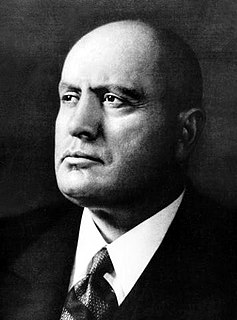 W
WBenito Amilcare Andrea Mussolini was an Italian politician and journalist who founded and led the National Fascist Party. He was Prime Minister of Italy from the March on Rome in 1922 until his deposition in 1943, and "Duce" of Italian Fascism from the establishment of the Italian Fasces of Combat in 1919 until his execution in 1945 by Italian partisans. As dictator of Italy and founder of fascism, Mussolini inspired and supported the international spread of fascist movements during the inter-war period.
 W
WGeorgios Papadopoulos was a Greek soldier, who headed a military coup d'état that took place in Greece on 21 April 1967, leading to a junta that ruled the country from 1967 to 1974. Papadopoulos held his dictatorial power until 1973, when he was himself overthrown by his co-conspirator Dimitrios Ioannidis.
 W
WAnte Pavelić was a Croatian politician and dictator who founded and headed the fascist ultranationalist organization known as the Ustaše in 1929 and governed the Independent State of Croatia, a fascist puppet state built out of parts of occupied Yugoslavia by the authorities of Nazi Germany and Fascist Italy, from 1941 to 1945. Pavelić and the Ustaše persecuted many racial minorities and political opponents in the NDH during the war, including Serbs, Jews, Romani, and anti-fascists, becoming one of the key figures of the Genocide of Serbs and the Holocaust in NDH.
 W
WHenri Philippe Benoni Omer Pétain, generally known as Philippe Pétain, Marshal Pétain and sometimes The Old Marshal, was a French general officer who attained the position of Marshal of France at the end of World War I, during which he became known as The Lion of Verdun. He then served as Chief of State of Vichy France from 1940 to 1944. Pétain, who was 84 years old in 1940, ranks as France's oldest head of state.
 W
WPuyi, courtesy name Yaozhi (曜之), was the last emperor of China as the eleventh and final Qing dynasty ruler. He became the Xuantong Emperor at age two in 1908, but was forced to abdicate on February 12, 1912 during the Xinhai Revolution. His era name as Qing emperor, "Xuantong", means "proclamation of unity". He later became the ruler of the Japanese puppet state of Manchukuo during World War II.
 W
WVidkun Abraham Lauritz Jonssøn Quisling was a Norwegian military officer, politician and Nazi collaborator who nominally headed the government of Norway during the country's occupation by Nazi Germany during World War II.
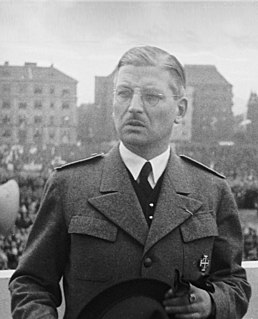 W
WKurt Alois Josef Johann Schuschnigg was an Austrian Fatherland Front politician who was the Chancellor of the Federal State of Austria from the 1934 assassination of his predecessor Engelbert Dollfuss until the 1938 Anschluss with Nazi Germany. Although Schuschnigg accepted that Austria was a "German state" and that Austrians were Germans, he was strongly opposed to Adolf Hitler's goal to absorb Austria into the Third Reich and wished for it to remain independent.
 W
WArthur Seyss-Inquart was an Austrian Nazi politician who served as Chancellor of Austria in 1938 for two days before the Anschluss. His positions during Third Reich included "deputy governor to Hans Frank in the General Government of Occupied Poland, and Reich commissioner for the German-occupied Netherlands" including shared responsibility "for the deportation of Dutch Jews and the shooting of hostages".
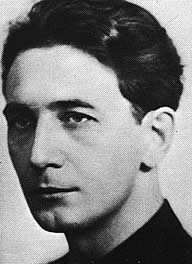 W
WHoria Sima was a Romanian fascist politician, best known as the second and last leader of the fascist paramilitary movement known as the Iron Guard. Sima was also the vice president of the council of ministers and de facto co-leader in Ion Antonescu's National Legionary State. Sima had previously served briefly as State Secretary of Education under Gheorghe Tătărescu in 1940, and as a short-lived Minister of Religion and Arts in the government of Ion Gigurtu.
 W
WJosef Terboven was a Nazi Party official and politician who was the long-serving Gauleiter of Gau Essen and the Reichskommissar for Norway during the German occupation.
 W
WJozef Gašpar Tiso was a Slovak politician and Roman Catholic priest who served as president of the Slovak Republic, a client state of Nazi Germany during World War II, from 1939 to 1945. In 1947, after the war, he was executed for war crimes and crimes against humanity in Bratislava.
 W
WHideki Tojo was a Japanese politician, general of the Imperial Japanese Army (IJA) and convicted war criminal who served as Prime Minister of Japan and President of the Imperial Rule Assistance Association for most of World War II. He assumed several more positions including Chief of Staff of the Imperial Army before ultimately being removed from office in July 1944. During his years in power, his leadership was marked by extreme state-perpetrated violence in the name of Japanese ultranationalism, in much of which he was personally involved.
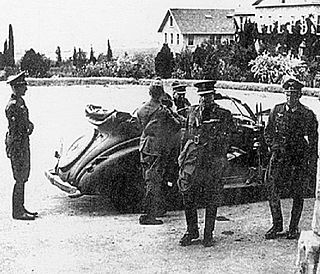 W
WGeorgios Tsolakoglou was an officer of the Hellenic Army who became the first Prime Minister of the Greek collaborationist government during the Axis occupation in 1941–1942.
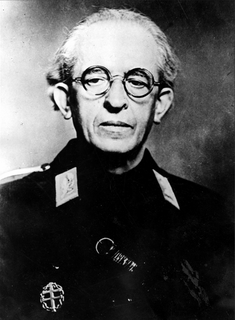 W
WVojtech Lázar "Béla" Tuka was a Slovak politician who served as prime minister and minister of Foreign Affairs of the First Slovak Republic between 1939 and 1945. Tuka was one of the main forces behind the deportation of Slovak Jews to Nazi concentration camps in German occupied Poland. He was the leader of the radical wing of the Slovak People's Party.
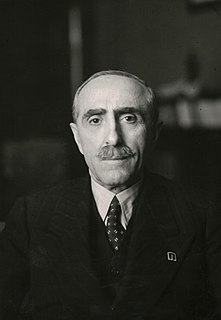 W
WShefqet bej Vërlaci, also known as Shevket Verlaci, was an Albanian politician and wealthy landowner.
 W
WWang Jingwei, born as Wang Zhaoming, but widely known by his pen name "Jingwei", was a Chinese politician. He was initially a member of the left wing of the Kuomintang (KMT), leading a government in Wuhan in opposition to the right-wing government in Nanjing, but later became increasingly anti-communist after his efforts to collaborate with the Chinese Communist Party ended in political failure. His political orientation veered sharply to the right later in his career after he collaborated with the Japanese.
 W
WZhang Jinghui ; was a Chinese general, warlord and politician during the Warlord era. He is noted for his role in the Japanese puppet regime of Manchukuo in which he served as its second and final Prime Minister.
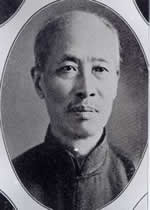 W
WZheng Xiaoxu was a Chinese statesman, diplomat and calligrapher. He served as the first Prime Minister of Manchukuo.